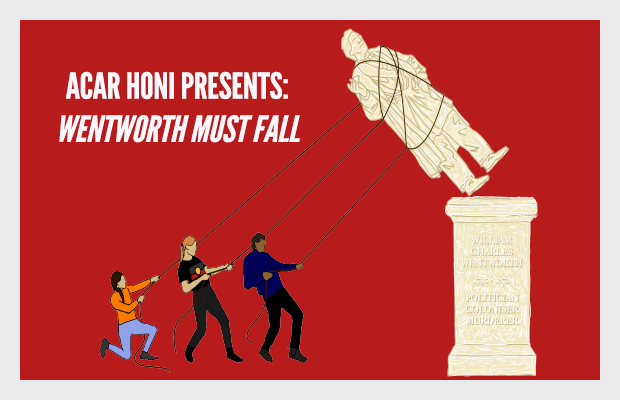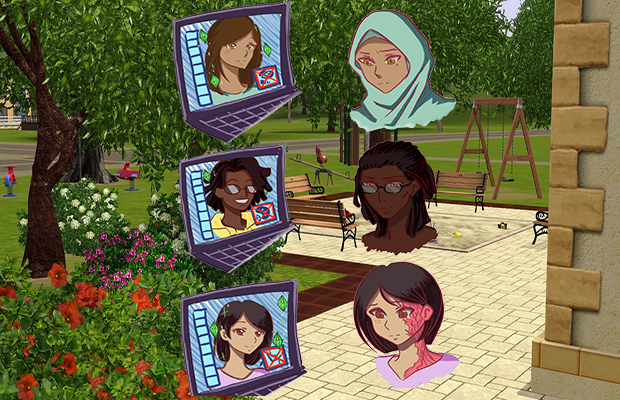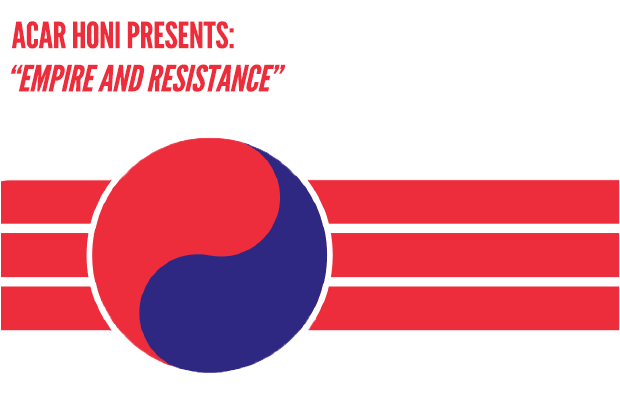In evaluating the success of the Rhodes Must Fall campaign, a particular reactionary caricature comes to mind – that decolonisation means historical erasure. Liberal and right-wing critics doubled down, with The Telegraph’s Harry Mount calling protestors “hypersensitive, unsophisticated, uneducated”.
The goal is precisely the opposite of historical erasure – it’s historical recovery. Recovery of histories of people slaughtered on mass – people whose memories are barely a footnote in Western mythology. While we can’t recover the millions of voices silenced by murder and systematic discrimination, we can set the facts straight.
William Charles Wentworth was a politician, journalist and very notably, a coloniser. In 1813 he rose from his aristocratic upbringing to popular prominence by discovering a crossing over the Blue Mountains. This route into central and western New South Wales ignited the flames of settler-colonial violence, facilitating the frontier conflicts that led to the death of tens of thousands of First Nations people. The ‘discovery’ as expected was fraud – the path was used by Wiradjuri, Gundungura and Dharug people for tens of thousands of years preceding it. For Wentworth, this actualised in personal wealth and political power – an influence which helped establish The University of Sydney.
What results is the Wentworth Must Fall Campaign. Our immediate goals are simple: rename the Wentworth building and tear down the Wentworth statue in the Great Hall. We seek to decolonise at large, and platform the colonialism Wentworth represented. It’s a process of historical rediscovery.
A Sinhalese man and a Koori woman walked into a bar. The following conversation is an attempt to document what the Wentworth Must Fall movement hopes to unravel.
Georgia: “We started this campaign in 2017 when a friend of mine was reading a book on him [Wentworth] and came to me saying “Georgia – this guy is fucked”.
I think this UniversityUniversity could turn around and name [the building] after an Indigenous Warrior and think that they’re doing good stuff – but nothing will have changed. The immediate aims are symbolic – but there is power in symbolism. That was what was so exciting about the Rhodes Must Fall movement in South Africa. It began with ‘fuck this guy let’s get him off our campus’ and went further to Fees Must Fall because the colonial legacy he instated is immanent in things like African access to tertiary education, wealth disparity and so on. And that’s decolonisation. It is something to get people talking about colonisation and colonies… but it’s never a means to an end. There’s work to be done.”
Himath: “I think that’s entirely correct. With the decolonisation movement, you’re platforming what colonialism actually was. I think one of colonisation’s biggest functions is to rewrite the history of an entire nation.”
Georgia: “Everybody knows Wentworth’s name, but knows nothing about what he actually did. To me, that’s rewriting history. Surely it’s more historically accurate than putting someone up on a pedestal when they don’t deserve it. A lot of people bite into the ‘post-racism’ myth of the Australian state because of the so-called multiculturalism of Australia. But any idea of multiculturalism is built on the idea of assimilation. Decolonisation challenges this very idea”.
Himath: “In the wake of the Christchurch shooting, there’s so much to reflect on – especially with with the shooter being an Australian. In his manifesto, although claiming that nationalism and fascism acknowledge the sovereignty of different people over their nation-state – he completely overlooks that the white ethnostate he admires requiress/d the destruction of national sovereignty of the non-white world. To him, Australia always was white land. To me, that’s why decolonisation plays a necessary role in the struggle against fascism. How do you see the decolonisation movement mixing in with the fight against the alt-right?”
Georgia: “Yeah, absolutely. The decolonisation movement counters at its very core the assertion that fascism and the alt-right have. That is, in Australia, we need to reclaim a White Australia. Any rigorous notion of sovereignty would contradict the claim that the ‘White Australia’ to be returned to was not a legitimate government. And while the target of fascist movements in Australia is Muslims and immigrants, it’s important to remember that so many people come from countries that are targets of Western Imperialism. We can’t be separating things in an identity politics way. Like ‘you are the victims now, we were the victims then’. The relationship goes both ways. We can’t focus on racial identities in isolation. I think Frantz Fanon speaks to this – when he talks about being aware of the person who is anti-semitic, they will feel the same towards you[a][b][c]. This is what makes decolonisation invariably a part of anti-racist movements. There’s no point in isolating them when we’re fighting against fascism”.
Himath: “I think that proves that our [migrant] voices are silenced by the same structures that silence colonised voices. The big threat of decolonial movements to the status quo and to the people who hold nationalist views is that it delegitimizes them, and it delegitimizes them in the most intellectually honest way – by uncovering the reality of the historical past they glorified with myths. It’s the same reality that White supremacists forget when they hold Western Civilisation to standards it doesn’t deserve – like it wasn’t built off the labour and natural resources in Sri Lanka and India; like it wasn’t built off slave labour from the Africas.
Georgia: “There’s this really cool Lebanese-Australian anthropologist, Ghassan Hage. He makes this really cool point that a lot of the reasons why white fascists are really afraid of a foreign invasion is because they know it’s possible to take over a country the same way they did. I think something you brought up about wage-labour and capital is that a lot of people regard pre-colonial Indigenous ways of being and knowing as somehow not successful. They’ll look at things like there’s not mass production, there’s no agriculture – which if you read Bruce Pascoe’s Dark Emu you’ll know is untrue. What there isn’t evidence of – is a system of exploitation on the scale of capitalism. What I think is successful is that Indigenous people have been here since time immemorial and haven’t created a fucked-up system that is tearing the planet apart. When we talk about this idea of Western Civilisation, what are we talking about? Systems of exploitation, slavery, ecocide?.”
Himath: “As we discussed earlier – there is no one who erases the past like colonisers”
Georgia: “It’s like that quote, history is written by the victors”.
[a]Fanon: “ When you hear someone insulting the Jews pay attention; he is talking about you. And I believed at the time he was universally right, meaning that I was responsible in my body and my soul for the fate reserved for my brother. Since then, I have understood that what he meant quite simply was the anti-Semite is inevitably a negrophobe.”




